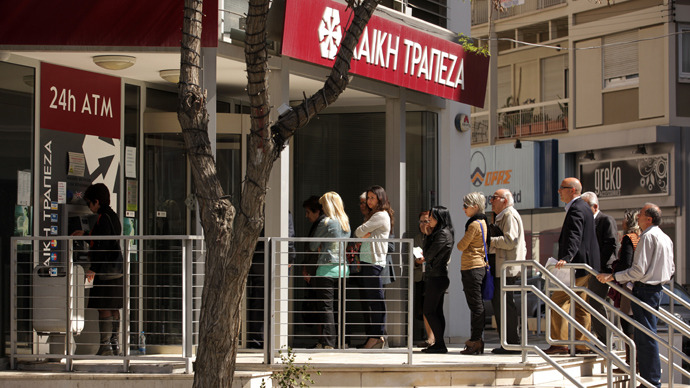EU’s kleptocratic intentions to result in confidence crisis

Right now there is no trust binding together the original ideas of the European free trade zone. Without that commercial backbone, there can be no confidence in the future of Europe.
"Cheer up, the worst is yet to come.”
-Philander Chase Johnson
An awful lot is written about markets, fear and greed.
Realistically, greed is just the phobia of not making enough
profit: so fear rules markets.
Meanwhile commerce can only flourish in an atmosphere of trust. Dysfunctional economies are bereft of trust. Governments develop laws to nurture confidence. The theory is that small transactional impediments will lead to so much trust that overall net prosperity is greater. Without property laws and basic rights, commerce cannot flourish.
Confidence remains a rather intangible item. Measuring trust is rather a black art. We can never be absolutely certain we have 100% trust but we can all recall the day, the precise moment even, when an unreliable associate finally lost our confidence.
Indeed, we may lose trust in something but do not act immediately - why face off against a thoroughly unprincipled individual, it usually is not worth the hassle. Much easier to just avoid their presence or fail to invite them to dinner. Why bother arguing with a liar?
In essence economic action is somewhat similar. In this respect, trust in the system is essential for economic growth. Without faith in government or law, entrepreneurs are crushed and economic dynamism is extinct. Nevertheless, the tipping point may be very distinct from the moment when finally the system collapses. People brood and consider their options but once their decisions are made, turning back is all the more difficult.
If we look at the world today, trust is a rather rare, and some might argue, endangered, commodity. Geographically diverse nations such as Australia and Russia are enjoying splendid prosperous booms. Singapore understands in every conduit of its governmental DNA that their economy lives or dies by the standards it sets to attract and nurture business.
Meanwhile, in Europe the Euro has been saved and confidence is returning. We know this because every few months ministers have a lavish late night dinner before pronouncing en masse that the world is a better place and the single currency goes from strength to strength. It’s about as convincing as that last chorus in Mozart operas where the cast extols their redemption despite having been perfectly beastly throughout the actual plot.
The truth is that as confidence has drained from the EU, now trust too is evaporating. The recent acts - whether enacted or not - in Cyprus has delivered a hammer blow to the credibility of Brussels as a trustworthy steward of anybody’s finances. Beneath a thin tissue of brazen statements of confidence there lie festering sores of economic mismanagement going septic as a result of previous poultices and treatments which are more voodoo than economics.
Jeroen Dijsselbloem, the Dutch Finance Minister has poured fuel on the flames of discord by noting that ‘bailing in’ depositors would henceforth be a Eurozone tenet for rescues. In other words totalitarian appropriation is now a Brussels policy. If ‘totalitarian appropriation’ is too big a word for this time of the day, dear reader, just spell it t-h-e-f-t. That’s close enough.
When trust evaporates it may not be immediately obvious but in the longer term you end up with a nation such as Argentina. The wonderful antiques markets of Buenos Aires burgeon with luxury hand-crafted items to remind us of how this great nation looked back in the day when commercial activities could trust the state. Nowadays, trust has evaporated with a government keener on agitprop and protectionism to try to maintain vested interests instead of growing prosperity. The EU may not be Argentina yet but for those wondering what the template is for the Eurozone’s future, it’s good food, great wine, interesting tourism and little hope of a job beyond waggling an umbrella in the air leading wealthy Chinese tourist groups.
The kleptocratic intentions of the EU will not go unnoticed and a confidence crisis will result both within and beyond the two-tier Eurozone. Meanwhile Spain has a weak government, Italy has no government and the French have something that is more like a group of middle-aged student idealists squatting in the Elysee palace until a leader comes along.
Ultimately trust is the glue which binds together trade and
prosperity.
Patrick L Young
Patrick L Young is an
active investor and entrepreneur in the New Europe as well as an
expert and advisor in financial markets.www.patricklyoung.net
The statements, views and opinions expressed in this column are solely those of the author and do not necessarily represent those of RT.
The statements, views and opinions expressed in this column are solely those of the author and do not necessarily represent those of RT.













